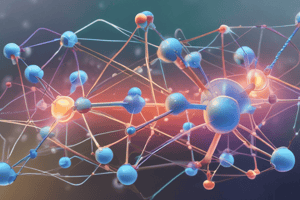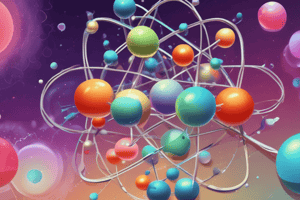Podcast
Questions and Answers
What is the main focus of chemistry?
What is the main focus of chemistry?
- The study of animal behavior
- The study of the properties of matter and how substances combine (correct)
- The study of geological formations
- The study of stars and celestial bodies
Which statement correctly defines matter?
Which statement correctly defines matter?
- Matter is everything that can be seen and touched.
- Matter is limited to solid forms only.
- Matter is all substances that exist in one state at a time.
- Matter is anything that has mass and occupies space. (correct)
Which of the following describes an atom?
Which of the following describes an atom?
- The largest unit of matter that defines substances
- The smallest unit of matter and a building block of elements (correct)
- A state of matter that can be seen without a microscope
- A collection of molecules brought together
What are the three main subatomic particles in an atom?
What are the three main subatomic particles in an atom?
In which part of the atom do protons and neutrons reside?
In which part of the atom do protons and neutrons reside?
How does matter exist in terms of states or phases?
How does matter exist in terms of states or phases?
How do electrons behave in relation to the nucleus of an atom?
How do electrons behave in relation to the nucleus of an atom?
What analogy is used to describe an atom in the context of size?
What analogy is used to describe an atom in the context of size?
What determines the identity of an element?
What determines the identity of an element?
Which of the following is a characteristic of a pure substance?
Which of the following is a characteristic of a pure substance?
What is the result when elements combine?
What is the result when elements combine?
What is a molecule?
What is a molecule?
Who created the first version of the periodic table?
Who created the first version of the periodic table?
Why is water considered a substance?
Why is water considered a substance?
Which statement about elements is true?
Which statement about elements is true?
What is the force that holds atoms together in a molecule?
What is the force that holds atoms together in a molecule?
Flashcards are hidden until you start studying
Study Notes
Introduction to Chemistry
- Chemistry explores the properties of matter, including how substances change, combine, and interact.
- Real-world examples, such as baking cookies, illustrate chemical processes.
What is Matter?
- Matter is anything that has mass and occupies space, including air, water, and various materials.
- Exists in three states: solids (e.g., ice), liquids (e.g., water), and gases (e.g., air).
Atoms: Nature's Building Block
- Atoms are the smallest units of matter, compared to tiny LEGO bricks.
- Cannot be seen with the naked eye but form the basis of all substances.
- Each atom consists of three subatomic particles: protons, neutrons, and electrons.
- Protons and neutrons form the nucleus, while electrons orbit around it.
- The number of protons in an atom defines the element (e.g., one proton for hydrogen, six for carbon).
Elements: Nature's Alphabet
- An element is a pure substance that cannot be chemically or physically broken down.
- Each substance has a specific composition; for example, water is always H₂O.
- Elements serve as the simplest forms of matter, made up of unique types of atoms.
- The periodic table organizes elements by their properties and includes their symbols (e.g., H for hydrogen, O for oxygen).
- Dmitri Mendeleev created the first periodic table, which is continuously updated with new discoveries.
Molecules: Mixing and Combining Elements
- Molecules form when two or more atoms combine through chemical bonds, creating new substances with distinct properties.
- Example: Two hydrogen atoms and one oxygen atom create water (H₂O), essential for life.
- Molecules can vary in complexity, from simple ones like oxygen to more intricate structures like sugars.
Chemistry in Everyday Life
- Chemistry is integral to daily activities, affecting everything from cooking to environmental interactions.
Studying That Suits You
Use AI to generate personalized quizzes and flashcards to suit your learning preferences.



